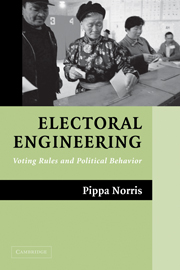Book contents
6 - Party Loyalties
Published online by Cambridge University Press: 05 September 2012
Summary
I demonstrated in Chapter 4 the mechanical effects of the electoral rules upon party systems, but we know far less about their indirect psychological impact upon patterns of party loyalties. The first part of this chapter reviews briefly both cultural modernization and rational choice accounts to establish the theoretical framework. The second part compares the strength of partisan identification, the social and political characteristics of partisans, and, also, to what degree these attachments vary under different electoral systems. The third part of the chapter goes on to consider to what extent these partisan bonds, in conjunction with social identities, help to explain voting behavior in the countries under comparison.
Theories of Partisan Identification
Cultural Modernization and Partisan Identification
Classic Michigan theories of electoral behavior by Campbell et al., which dominated the field of the study of voting behavior in the United States for many decades, focused on individual-level voting choices rather than on their broader institutional context. The model, derived from social psychology, suggested that most voters in the United States were anchored over successive elections, and sometimes for their lifetimes, by persistent loyalties to a particular party. Partisan identification was understood in the original theory as an affective orientation or habit of the heart, where American voters came to see themselves as habitual Democrats or Republicans, as part of their core self-identity, rather as they came to see themselves as Southerners or New Englanders, Catholics or Protestants, and fans of the Yankees or the Red Sox.
- Type
- Chapter
- Information
- Electoral EngineeringVoting Rules and Political Behavior, pp. 126 - 150Publisher: Cambridge University PressPrint publication year: 2004



